BA Business Management: Leadership Styles Impact on Performance
VerifiedAdded on 2023/06/15
|10
|2673
|141
Project
AI Summary
This research proposal aims to analyze the impact of leadership styles on company performance, focusing on transformational, laissez-faire, transactional, and autocratic leadership. It outlines the research questions, literature review, and methodology, including a quantitative approach using questionnaires distributed through personal meetings and emails to a sample of 100 employees. The proposal details the research philosophy (positivism), paradigm (pragmatic), and strategy (qualitative), along with ethical considerations and a timeline for the research activities. Both primary and secondary data will be used and analyzed using statistical methods to determine the influence of different leadership styles on organizational outcomes.
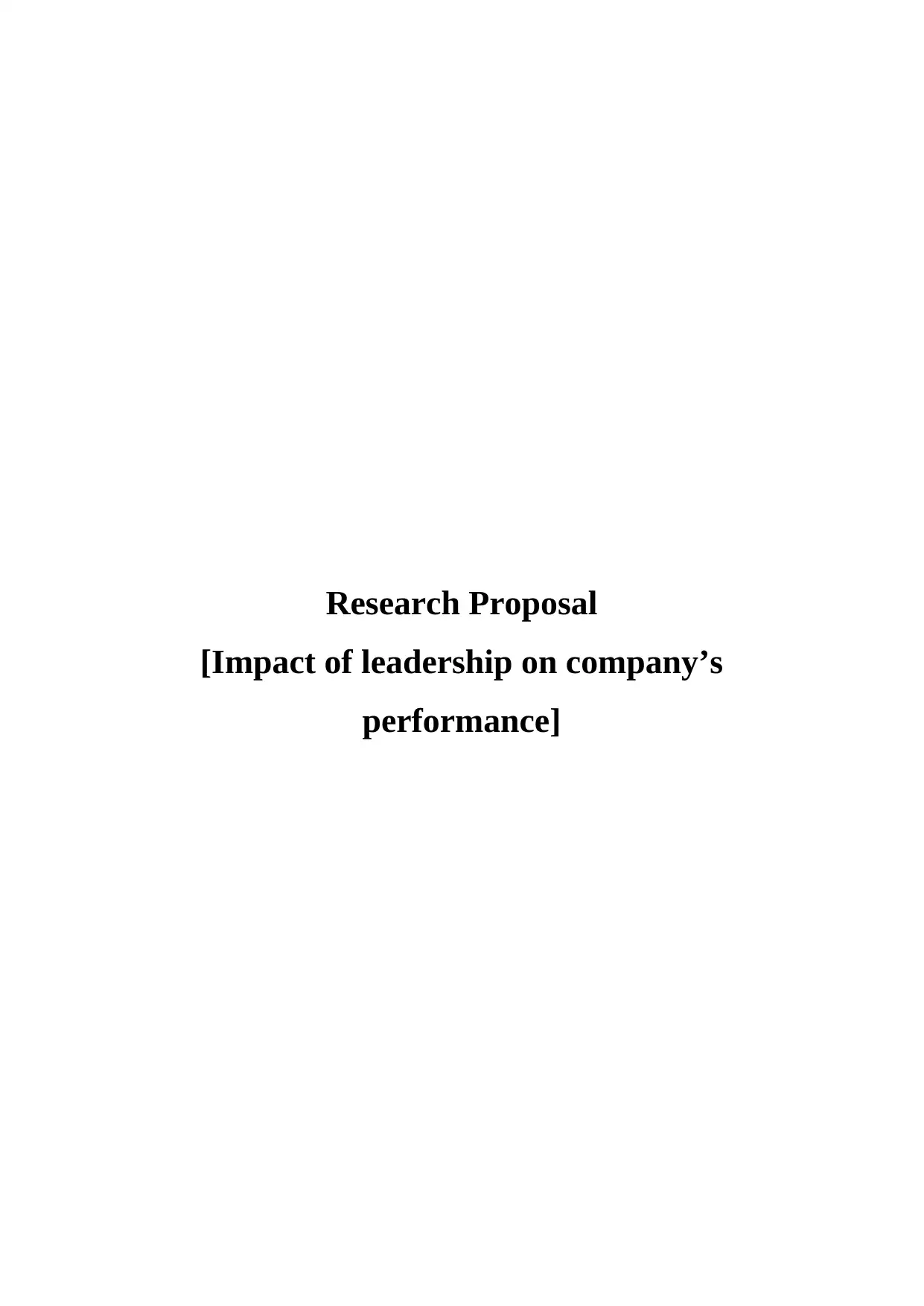
Research Proposal
[Impact of leadership on company’s
performance]
[Impact of leadership on company’s
performance]
Paraphrase This Document
Need a fresh take? Get an instant paraphrase of this document with our AI Paraphraser
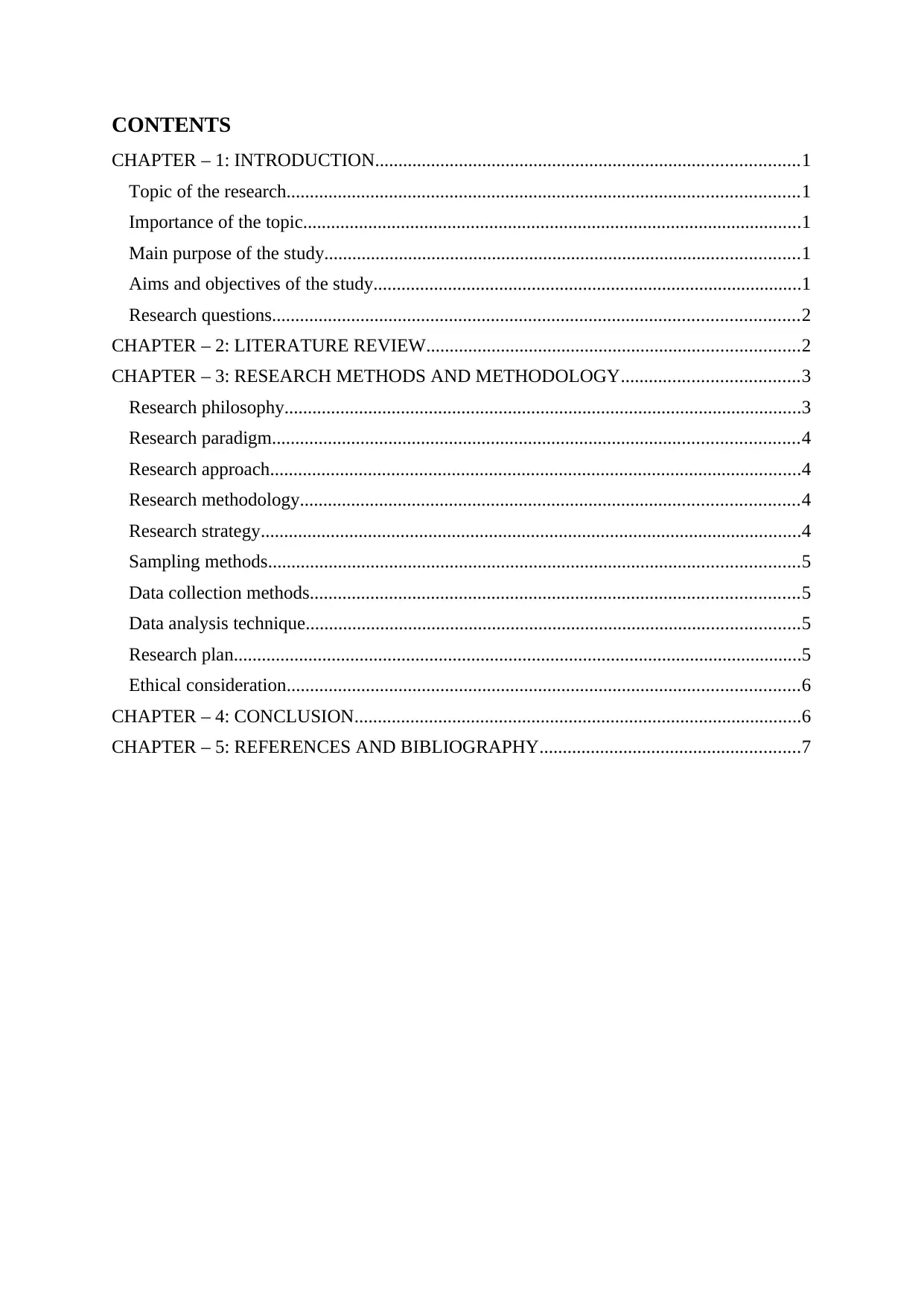
CONTENTS
CHAPTER – 1: INTRODUCTION...........................................................................................1
Topic of the research..............................................................................................................1
Importance of the topic...........................................................................................................1
Main purpose of the study......................................................................................................1
Aims and objectives of the study............................................................................................1
Research questions.................................................................................................................2
CHAPTER – 2: LITERATURE REVIEW................................................................................2
CHAPTER – 3: RESEARCH METHODS AND METHODOLOGY......................................3
Research philosophy...............................................................................................................3
Research paradigm.................................................................................................................4
Research approach..................................................................................................................4
Research methodology...........................................................................................................4
Research strategy....................................................................................................................4
Sampling methods..................................................................................................................5
Data collection methods.........................................................................................................5
Data analysis technique..........................................................................................................5
Research plan..........................................................................................................................5
Ethical consideration..............................................................................................................6
CHAPTER – 4: CONCLUSION................................................................................................6
CHAPTER – 5: REFERENCES AND BIBLIOGRAPHY........................................................7
CHAPTER – 1: INTRODUCTION...........................................................................................1
Topic of the research..............................................................................................................1
Importance of the topic...........................................................................................................1
Main purpose of the study......................................................................................................1
Aims and objectives of the study............................................................................................1
Research questions.................................................................................................................2
CHAPTER – 2: LITERATURE REVIEW................................................................................2
CHAPTER – 3: RESEARCH METHODS AND METHODOLOGY......................................3
Research philosophy...............................................................................................................3
Research paradigm.................................................................................................................4
Research approach..................................................................................................................4
Research methodology...........................................................................................................4
Research strategy....................................................................................................................4
Sampling methods..................................................................................................................5
Data collection methods.........................................................................................................5
Data analysis technique..........................................................................................................5
Research plan..........................................................................................................................5
Ethical consideration..............................................................................................................6
CHAPTER – 4: CONCLUSION................................................................................................6
CHAPTER – 5: REFERENCES AND BIBLIOGRAPHY........................................................7
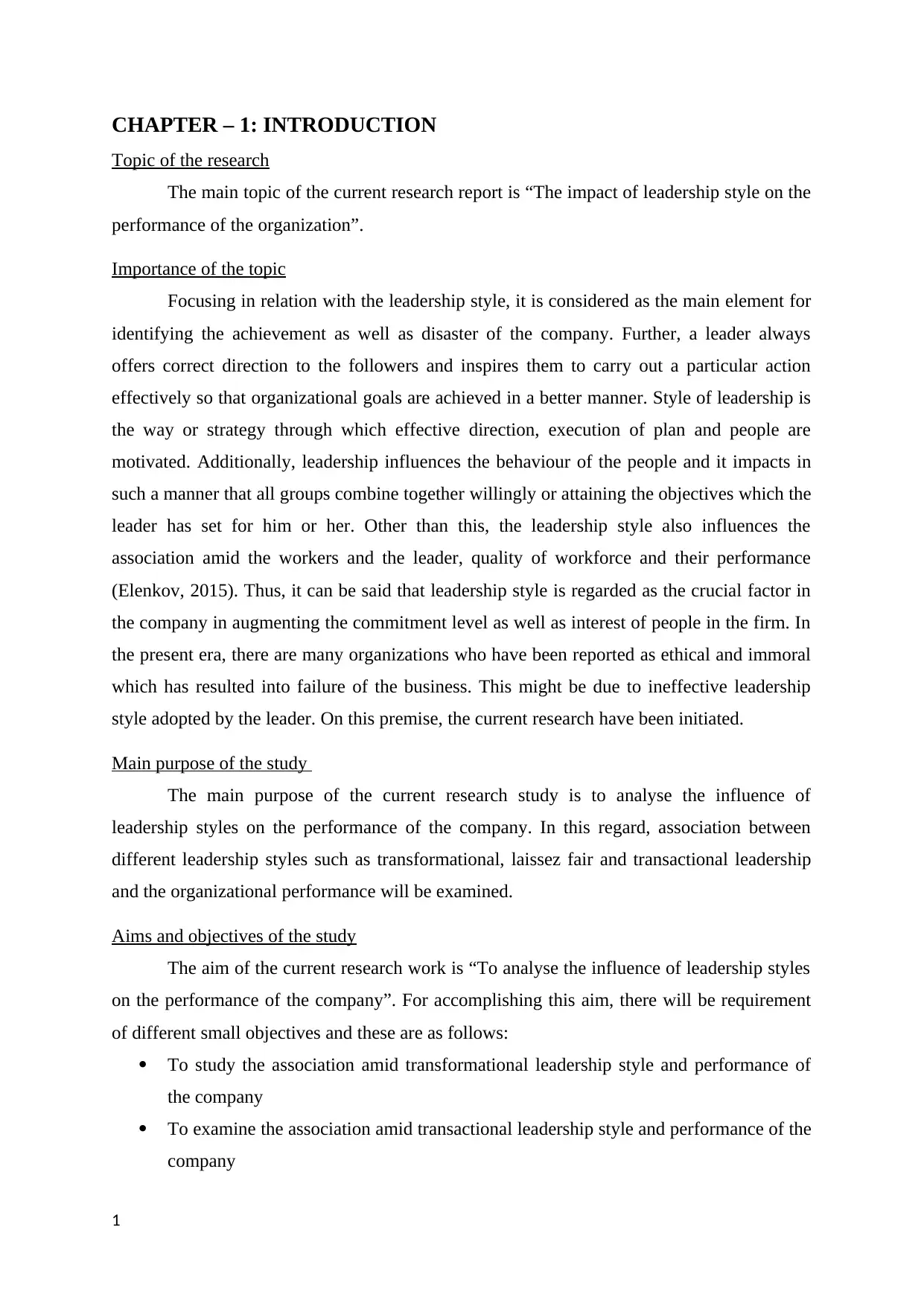
CHAPTER – 1: INTRODUCTION
Topic of the research
The main topic of the current research report is “The impact of leadership style on the
performance of the organization”.
Importance of the topic
Focusing in relation with the leadership style, it is considered as the main element for
identifying the achievement as well as disaster of the company. Further, a leader always
offers correct direction to the followers and inspires them to carry out a particular action
effectively so that organizational goals are achieved in a better manner. Style of leadership is
the way or strategy through which effective direction, execution of plan and people are
motivated. Additionally, leadership influences the behaviour of the people and it impacts in
such a manner that all groups combine together willingly or attaining the objectives which the
leader has set for him or her. Other than this, the leadership style also influences the
association amid the workers and the leader, quality of workforce and their performance
(Elenkov, 2015). Thus, it can be said that leadership style is regarded as the crucial factor in
the company in augmenting the commitment level as well as interest of people in the firm. In
the present era, there are many organizations who have been reported as ethical and immoral
which has resulted into failure of the business. This might be due to ineffective leadership
style adopted by the leader. On this premise, the current research have been initiated.
Main purpose of the study
The main purpose of the current research study is to analyse the influence of
leadership styles on the performance of the company. In this regard, association between
different leadership styles such as transformational, laissez fair and transactional leadership
and the organizational performance will be examined.
Aims and objectives of the study
The aim of the current research work is “To analyse the influence of leadership styles
on the performance of the company”. For accomplishing this aim, there will be requirement
of different small objectives and these are as follows:
To study the association amid transformational leadership style and performance of
the company
To examine the association amid transactional leadership style and performance of the
company
1
Topic of the research
The main topic of the current research report is “The impact of leadership style on the
performance of the organization”.
Importance of the topic
Focusing in relation with the leadership style, it is considered as the main element for
identifying the achievement as well as disaster of the company. Further, a leader always
offers correct direction to the followers and inspires them to carry out a particular action
effectively so that organizational goals are achieved in a better manner. Style of leadership is
the way or strategy through which effective direction, execution of plan and people are
motivated. Additionally, leadership influences the behaviour of the people and it impacts in
such a manner that all groups combine together willingly or attaining the objectives which the
leader has set for him or her. Other than this, the leadership style also influences the
association amid the workers and the leader, quality of workforce and their performance
(Elenkov, 2015). Thus, it can be said that leadership style is regarded as the crucial factor in
the company in augmenting the commitment level as well as interest of people in the firm. In
the present era, there are many organizations who have been reported as ethical and immoral
which has resulted into failure of the business. This might be due to ineffective leadership
style adopted by the leader. On this premise, the current research have been initiated.
Main purpose of the study
The main purpose of the current research study is to analyse the influence of
leadership styles on the performance of the company. In this regard, association between
different leadership styles such as transformational, laissez fair and transactional leadership
and the organizational performance will be examined.
Aims and objectives of the study
The aim of the current research work is “To analyse the influence of leadership styles
on the performance of the company”. For accomplishing this aim, there will be requirement
of different small objectives and these are as follows:
To study the association amid transformational leadership style and performance of
the company
To examine the association amid transactional leadership style and performance of the
company
1
⊘ This is a preview!⊘
Do you want full access?
Subscribe today to unlock all pages.

Trusted by 1+ million students worldwide
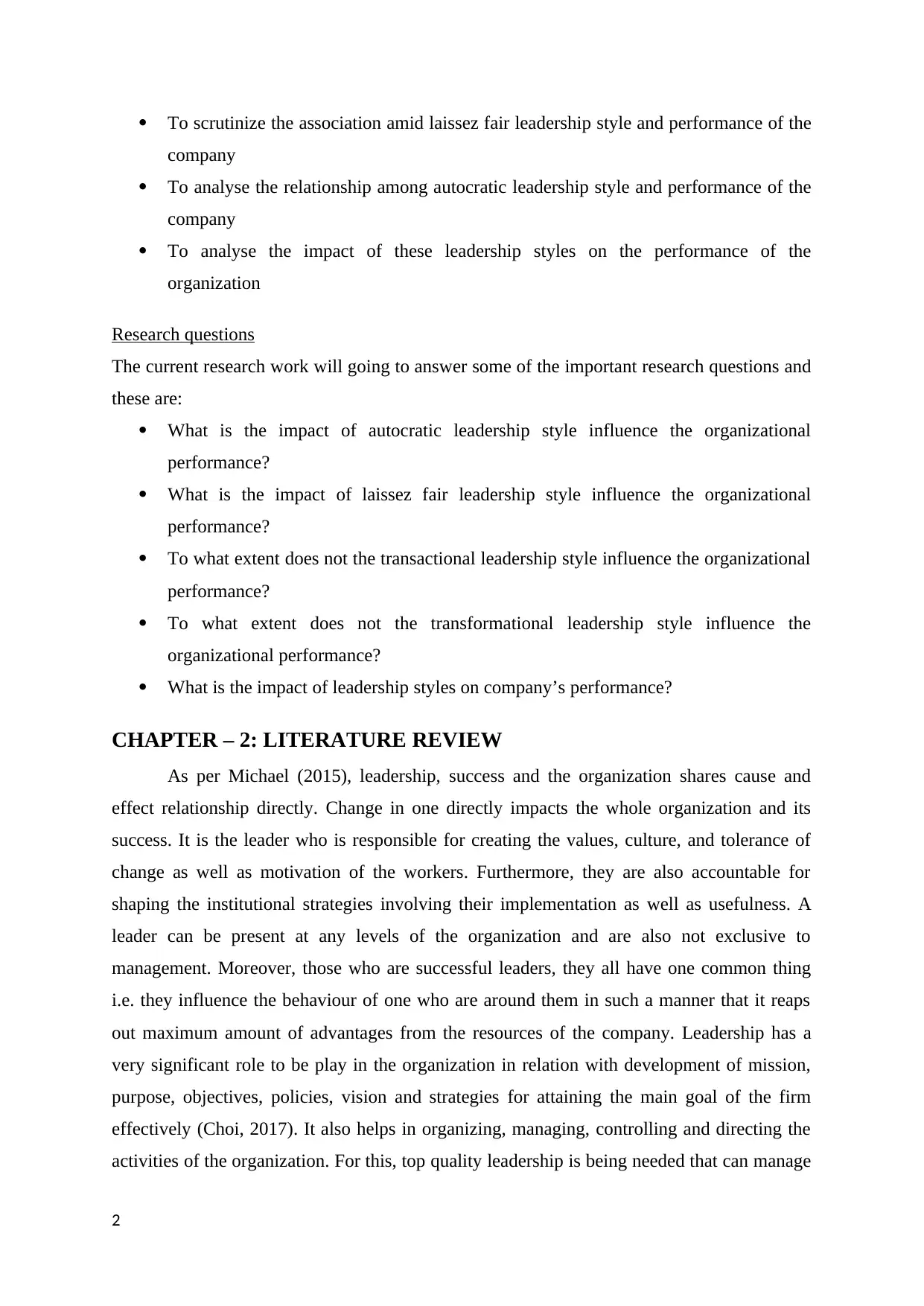
To scrutinize the association amid laissez fair leadership style and performance of the
company
To analyse the relationship among autocratic leadership style and performance of the
company
To analyse the impact of these leadership styles on the performance of the
organization
Research questions
The current research work will going to answer some of the important research questions and
these are:
What is the impact of autocratic leadership style influence the organizational
performance?
What is the impact of laissez fair leadership style influence the organizational
performance?
To what extent does not the transactional leadership style influence the organizational
performance?
To what extent does not the transformational leadership style influence the
organizational performance?
What is the impact of leadership styles on company’s performance?
CHAPTER – 2: LITERATURE REVIEW
As per Michael (2015), leadership, success and the organization shares cause and
effect relationship directly. Change in one directly impacts the whole organization and its
success. It is the leader who is responsible for creating the values, culture, and tolerance of
change as well as motivation of the workers. Furthermore, they are also accountable for
shaping the institutional strategies involving their implementation as well as usefulness. A
leader can be present at any levels of the organization and are also not exclusive to
management. Moreover, those who are successful leaders, they all have one common thing
i.e. they influence the behaviour of one who are around them in such a manner that it reaps
out maximum amount of advantages from the resources of the company. Leadership has a
very significant role to be play in the organization in relation with development of mission,
purpose, objectives, policies, vision and strategies for attaining the main goal of the firm
effectively (Choi, 2017). It also helps in organizing, managing, controlling and directing the
activities of the organization. For this, top quality leadership is being needed that can manage
2
company
To analyse the relationship among autocratic leadership style and performance of the
company
To analyse the impact of these leadership styles on the performance of the
organization
Research questions
The current research work will going to answer some of the important research questions and
these are:
What is the impact of autocratic leadership style influence the organizational
performance?
What is the impact of laissez fair leadership style influence the organizational
performance?
To what extent does not the transactional leadership style influence the organizational
performance?
To what extent does not the transformational leadership style influence the
organizational performance?
What is the impact of leadership styles on company’s performance?
CHAPTER – 2: LITERATURE REVIEW
As per Michael (2015), leadership, success and the organization shares cause and
effect relationship directly. Change in one directly impacts the whole organization and its
success. It is the leader who is responsible for creating the values, culture, and tolerance of
change as well as motivation of the workers. Furthermore, they are also accountable for
shaping the institutional strategies involving their implementation as well as usefulness. A
leader can be present at any levels of the organization and are also not exclusive to
management. Moreover, those who are successful leaders, they all have one common thing
i.e. they influence the behaviour of one who are around them in such a manner that it reaps
out maximum amount of advantages from the resources of the company. Leadership has a
very significant role to be play in the organization in relation with development of mission,
purpose, objectives, policies, vision and strategies for attaining the main goal of the firm
effectively (Choi, 2017). It also helps in organizing, managing, controlling and directing the
activities of the organization. For this, top quality leadership is being needed that can manage
2
Paraphrase This Document
Need a fresh take? Get an instant paraphrase of this document with our AI Paraphraser
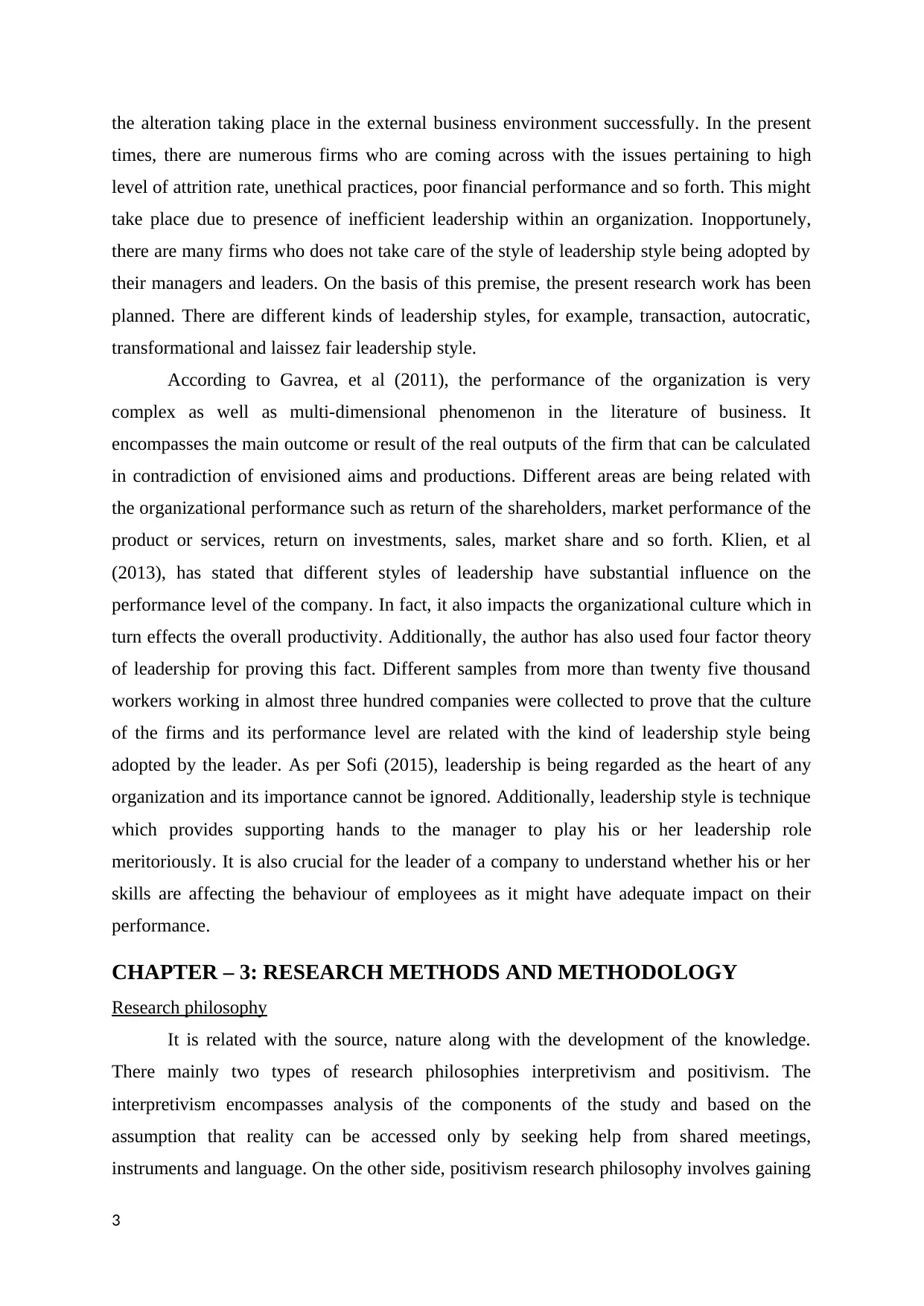
the alteration taking place in the external business environment successfully. In the present
times, there are numerous firms who are coming across with the issues pertaining to high
level of attrition rate, unethical practices, poor financial performance and so forth. This might
take place due to presence of inefficient leadership within an organization. Inopportunely,
there are many firms who does not take care of the style of leadership style being adopted by
their managers and leaders. On the basis of this premise, the present research work has been
planned. There are different kinds of leadership styles, for example, transaction, autocratic,
transformational and laissez fair leadership style.
According to Gavrea, et al (2011), the performance of the organization is very
complex as well as multi-dimensional phenomenon in the literature of business. It
encompasses the main outcome or result of the real outputs of the firm that can be calculated
in contradiction of envisioned aims and productions. Different areas are being related with
the organizational performance such as return of the shareholders, market performance of the
product or services, return on investments, sales, market share and so forth. Klien, et al
(2013), has stated that different styles of leadership have substantial influence on the
performance level of the company. In fact, it also impacts the organizational culture which in
turn effects the overall productivity. Additionally, the author has also used four factor theory
of leadership for proving this fact. Different samples from more than twenty five thousand
workers working in almost three hundred companies were collected to prove that the culture
of the firms and its performance level are related with the kind of leadership style being
adopted by the leader. As per Sofi (2015), leadership is being regarded as the heart of any
organization and its importance cannot be ignored. Additionally, leadership style is technique
which provides supporting hands to the manager to play his or her leadership role
meritoriously. It is also crucial for the leader of a company to understand whether his or her
skills are affecting the behaviour of employees as it might have adequate impact on their
performance.
CHAPTER – 3: RESEARCH METHODS AND METHODOLOGY
Research philosophy
It is related with the source, nature along with the development of the knowledge.
There mainly two types of research philosophies interpretivism and positivism. The
interpretivism encompasses analysis of the components of the study and based on the
assumption that reality can be accessed only by seeking help from shared meetings,
instruments and language. On the other side, positivism research philosophy involves gaining
3
times, there are numerous firms who are coming across with the issues pertaining to high
level of attrition rate, unethical practices, poor financial performance and so forth. This might
take place due to presence of inefficient leadership within an organization. Inopportunely,
there are many firms who does not take care of the style of leadership style being adopted by
their managers and leaders. On the basis of this premise, the present research work has been
planned. There are different kinds of leadership styles, for example, transaction, autocratic,
transformational and laissez fair leadership style.
According to Gavrea, et al (2011), the performance of the organization is very
complex as well as multi-dimensional phenomenon in the literature of business. It
encompasses the main outcome or result of the real outputs of the firm that can be calculated
in contradiction of envisioned aims and productions. Different areas are being related with
the organizational performance such as return of the shareholders, market performance of the
product or services, return on investments, sales, market share and so forth. Klien, et al
(2013), has stated that different styles of leadership have substantial influence on the
performance level of the company. In fact, it also impacts the organizational culture which in
turn effects the overall productivity. Additionally, the author has also used four factor theory
of leadership for proving this fact. Different samples from more than twenty five thousand
workers working in almost three hundred companies were collected to prove that the culture
of the firms and its performance level are related with the kind of leadership style being
adopted by the leader. As per Sofi (2015), leadership is being regarded as the heart of any
organization and its importance cannot be ignored. Additionally, leadership style is technique
which provides supporting hands to the manager to play his or her leadership role
meritoriously. It is also crucial for the leader of a company to understand whether his or her
skills are affecting the behaviour of employees as it might have adequate impact on their
performance.
CHAPTER – 3: RESEARCH METHODS AND METHODOLOGY
Research philosophy
It is related with the source, nature along with the development of the knowledge.
There mainly two types of research philosophies interpretivism and positivism. The
interpretivism encompasses analysis of the components of the study and based on the
assumption that reality can be accessed only by seeking help from shared meetings,
instruments and language. On the other side, positivism research philosophy involves gaining
3
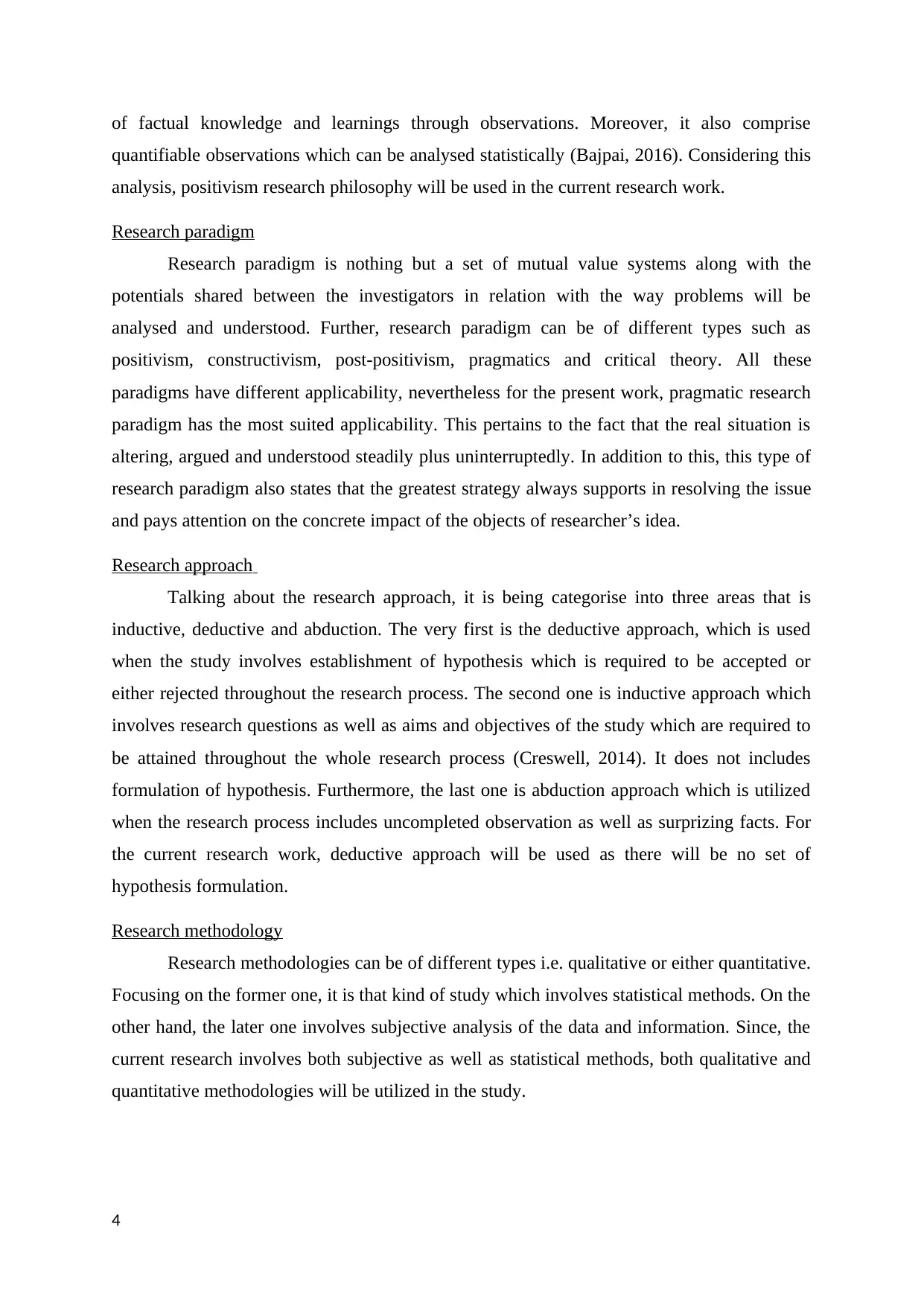
of factual knowledge and learnings through observations. Moreover, it also comprise
quantifiable observations which can be analysed statistically (Bajpai, 2016). Considering this
analysis, positivism research philosophy will be used in the current research work.
Research paradigm
Research paradigm is nothing but a set of mutual value systems along with the
potentials shared between the investigators in relation with the way problems will be
analysed and understood. Further, research paradigm can be of different types such as
positivism, constructivism, post-positivism, pragmatics and critical theory. All these
paradigms have different applicability, nevertheless for the present work, pragmatic research
paradigm has the most suited applicability. This pertains to the fact that the real situation is
altering, argued and understood steadily plus uninterruptedly. In addition to this, this type of
research paradigm also states that the greatest strategy always supports in resolving the issue
and pays attention on the concrete impact of the objects of researcher’s idea.
Research approach
Talking about the research approach, it is being categorise into three areas that is
inductive, deductive and abduction. The very first is the deductive approach, which is used
when the study involves establishment of hypothesis which is required to be accepted or
either rejected throughout the research process. The second one is inductive approach which
involves research questions as well as aims and objectives of the study which are required to
be attained throughout the whole research process (Creswell, 2014). It does not includes
formulation of hypothesis. Furthermore, the last one is abduction approach which is utilized
when the research process includes uncompleted observation as well as surprizing facts. For
the current research work, deductive approach will be used as there will be no set of
hypothesis formulation.
Research methodology
Research methodologies can be of different types i.e. qualitative or either quantitative.
Focusing on the former one, it is that kind of study which involves statistical methods. On the
other hand, the later one involves subjective analysis of the data and information. Since, the
current research involves both subjective as well as statistical methods, both qualitative and
quantitative methodologies will be utilized in the study.
4
quantifiable observations which can be analysed statistically (Bajpai, 2016). Considering this
analysis, positivism research philosophy will be used in the current research work.
Research paradigm
Research paradigm is nothing but a set of mutual value systems along with the
potentials shared between the investigators in relation with the way problems will be
analysed and understood. Further, research paradigm can be of different types such as
positivism, constructivism, post-positivism, pragmatics and critical theory. All these
paradigms have different applicability, nevertheless for the present work, pragmatic research
paradigm has the most suited applicability. This pertains to the fact that the real situation is
altering, argued and understood steadily plus uninterruptedly. In addition to this, this type of
research paradigm also states that the greatest strategy always supports in resolving the issue
and pays attention on the concrete impact of the objects of researcher’s idea.
Research approach
Talking about the research approach, it is being categorise into three areas that is
inductive, deductive and abduction. The very first is the deductive approach, which is used
when the study involves establishment of hypothesis which is required to be accepted or
either rejected throughout the research process. The second one is inductive approach which
involves research questions as well as aims and objectives of the study which are required to
be attained throughout the whole research process (Creswell, 2014). It does not includes
formulation of hypothesis. Furthermore, the last one is abduction approach which is utilized
when the research process includes uncompleted observation as well as surprizing facts. For
the current research work, deductive approach will be used as there will be no set of
hypothesis formulation.
Research methodology
Research methodologies can be of different types i.e. qualitative or either quantitative.
Focusing on the former one, it is that kind of study which involves statistical methods. On the
other hand, the later one involves subjective analysis of the data and information. Since, the
current research involves both subjective as well as statistical methods, both qualitative and
quantitative methodologies will be utilized in the study.
4
⊘ This is a preview!⊘
Do you want full access?
Subscribe today to unlock all pages.

Trusted by 1+ million students worldwide
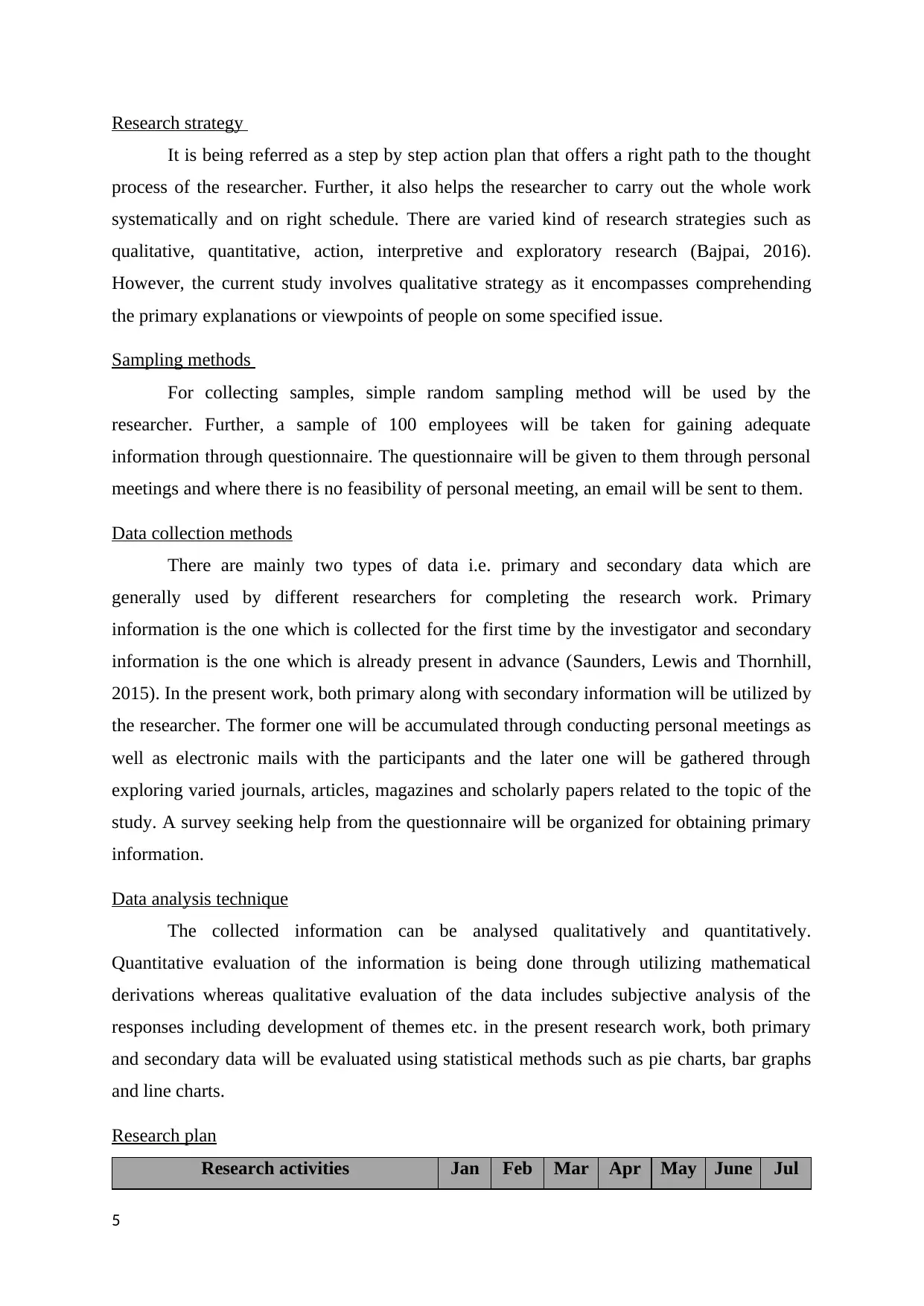
Research strategy
It is being referred as a step by step action plan that offers a right path to the thought
process of the researcher. Further, it also helps the researcher to carry out the whole work
systematically and on right schedule. There are varied kind of research strategies such as
qualitative, quantitative, action, interpretive and exploratory research (Bajpai, 2016).
However, the current study involves qualitative strategy as it encompasses comprehending
the primary explanations or viewpoints of people on some specified issue.
Sampling methods
For collecting samples, simple random sampling method will be used by the
researcher. Further, a sample of 100 employees will be taken for gaining adequate
information through questionnaire. The questionnaire will be given to them through personal
meetings and where there is no feasibility of personal meeting, an email will be sent to them.
Data collection methods
There are mainly two types of data i.e. primary and secondary data which are
generally used by different researchers for completing the research work. Primary
information is the one which is collected for the first time by the investigator and secondary
information is the one which is already present in advance (Saunders, Lewis and Thornhill,
2015). In the present work, both primary along with secondary information will be utilized by
the researcher. The former one will be accumulated through conducting personal meetings as
well as electronic mails with the participants and the later one will be gathered through
exploring varied journals, articles, magazines and scholarly papers related to the topic of the
study. A survey seeking help from the questionnaire will be organized for obtaining primary
information.
Data analysis technique
The collected information can be analysed qualitatively and quantitatively.
Quantitative evaluation of the information is being done through utilizing mathematical
derivations whereas qualitative evaluation of the data includes subjective analysis of the
responses including development of themes etc. in the present research work, both primary
and secondary data will be evaluated using statistical methods such as pie charts, bar graphs
and line charts.
Research plan
Research activities Jan Feb Mar Apr May June Jul
5
It is being referred as a step by step action plan that offers a right path to the thought
process of the researcher. Further, it also helps the researcher to carry out the whole work
systematically and on right schedule. There are varied kind of research strategies such as
qualitative, quantitative, action, interpretive and exploratory research (Bajpai, 2016).
However, the current study involves qualitative strategy as it encompasses comprehending
the primary explanations or viewpoints of people on some specified issue.
Sampling methods
For collecting samples, simple random sampling method will be used by the
researcher. Further, a sample of 100 employees will be taken for gaining adequate
information through questionnaire. The questionnaire will be given to them through personal
meetings and where there is no feasibility of personal meeting, an email will be sent to them.
Data collection methods
There are mainly two types of data i.e. primary and secondary data which are
generally used by different researchers for completing the research work. Primary
information is the one which is collected for the first time by the investigator and secondary
information is the one which is already present in advance (Saunders, Lewis and Thornhill,
2015). In the present work, both primary along with secondary information will be utilized by
the researcher. The former one will be accumulated through conducting personal meetings as
well as electronic mails with the participants and the later one will be gathered through
exploring varied journals, articles, magazines and scholarly papers related to the topic of the
study. A survey seeking help from the questionnaire will be organized for obtaining primary
information.
Data analysis technique
The collected information can be analysed qualitatively and quantitatively.
Quantitative evaluation of the information is being done through utilizing mathematical
derivations whereas qualitative evaluation of the data includes subjective analysis of the
responses including development of themes etc. in the present research work, both primary
and secondary data will be evaluated using statistical methods such as pie charts, bar graphs
and line charts.
Research plan
Research activities Jan Feb Mar Apr May June Jul
5
Paraphrase This Document
Need a fresh take? Get an instant paraphrase of this document with our AI Paraphraser
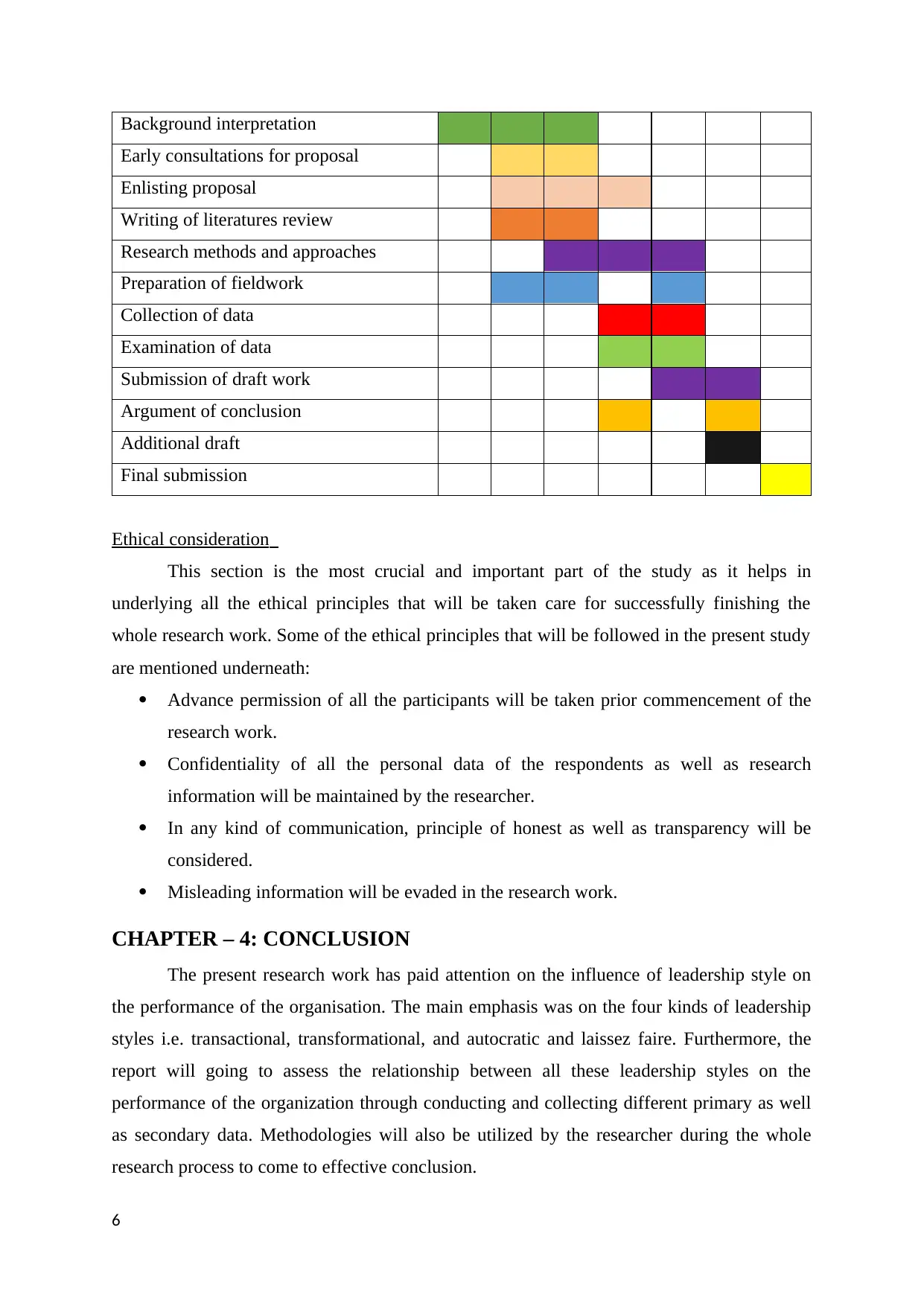
Background interpretation
Early consultations for proposal
Enlisting proposal
Writing of literatures review
Research methods and approaches
Preparation of fieldwork
Collection of data
Examination of data
Submission of draft work
Argument of conclusion
Additional draft
Final submission
Ethical consideration
This section is the most crucial and important part of the study as it helps in
underlying all the ethical principles that will be taken care for successfully finishing the
whole research work. Some of the ethical principles that will be followed in the present study
are mentioned underneath:
Advance permission of all the participants will be taken prior commencement of the
research work.
Confidentiality of all the personal data of the respondents as well as research
information will be maintained by the researcher.
In any kind of communication, principle of honest as well as transparency will be
considered.
Misleading information will be evaded in the research work.
CHAPTER – 4: CONCLUSION
The present research work has paid attention on the influence of leadership style on
the performance of the organisation. The main emphasis was on the four kinds of leadership
styles i.e. transactional, transformational, and autocratic and laissez faire. Furthermore, the
report will going to assess the relationship between all these leadership styles on the
performance of the organization through conducting and collecting different primary as well
as secondary data. Methodologies will also be utilized by the researcher during the whole
research process to come to effective conclusion.
6
Early consultations for proposal
Enlisting proposal
Writing of literatures review
Research methods and approaches
Preparation of fieldwork
Collection of data
Examination of data
Submission of draft work
Argument of conclusion
Additional draft
Final submission
Ethical consideration
This section is the most crucial and important part of the study as it helps in
underlying all the ethical principles that will be taken care for successfully finishing the
whole research work. Some of the ethical principles that will be followed in the present study
are mentioned underneath:
Advance permission of all the participants will be taken prior commencement of the
research work.
Confidentiality of all the personal data of the respondents as well as research
information will be maintained by the researcher.
In any kind of communication, principle of honest as well as transparency will be
considered.
Misleading information will be evaded in the research work.
CHAPTER – 4: CONCLUSION
The present research work has paid attention on the influence of leadership style on
the performance of the organisation. The main emphasis was on the four kinds of leadership
styles i.e. transactional, transformational, and autocratic and laissez faire. Furthermore, the
report will going to assess the relationship between all these leadership styles on the
performance of the organization through conducting and collecting different primary as well
as secondary data. Methodologies will also be utilized by the researcher during the whole
research process to come to effective conclusion.
6

7
⊘ This is a preview!⊘
Do you want full access?
Subscribe today to unlock all pages.

Trusted by 1+ million students worldwide
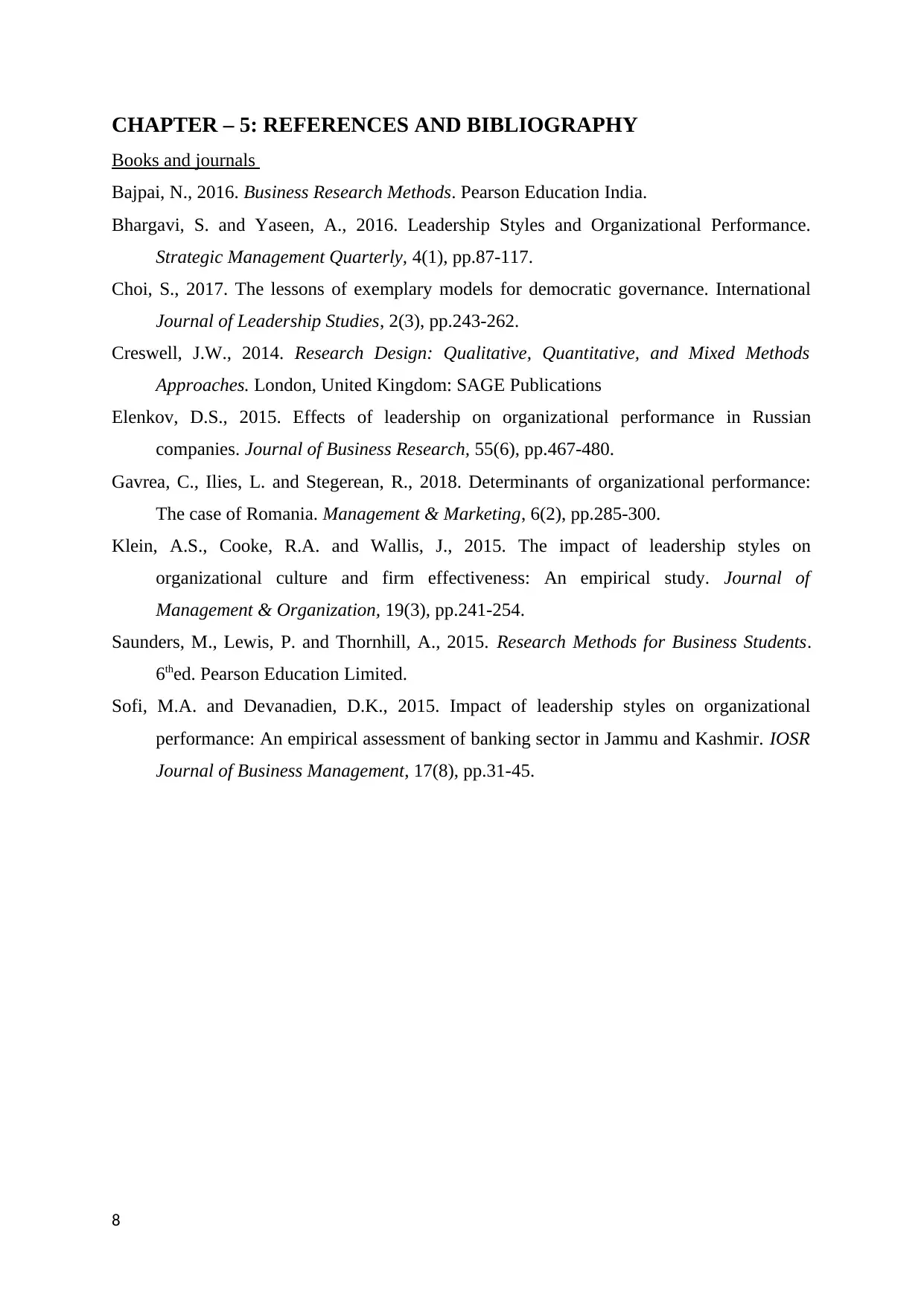
CHAPTER – 5: REFERENCES AND BIBLIOGRAPHY
Books and journals
Bajpai, N., 2016. Business Research Methods. Pearson Education India.
Bhargavi, S. and Yaseen, A., 2016. Leadership Styles and Organizational Performance.
Strategic Management Quarterly, 4(1), pp.87-117.
Choi, S., 2017. The lessons of exemplary models for democratic governance. International
Journal of Leadership Studies, 2(3), pp.243-262.
Creswell, J.W., 2014. Research Design: Qualitative, Quantitative, and Mixed Methods
Approaches. London, United Kingdom: SAGE Publications
Elenkov, D.S., 2015. Effects of leadership on organizational performance in Russian
companies. Journal of Business Research, 55(6), pp.467-480.
Gavrea, C., Ilies, L. and Stegerean, R., 2018. Determinants of organizational performance:
The case of Romania. Management & Marketing, 6(2), pp.285-300.
Klein, A.S., Cooke, R.A. and Wallis, J., 2015. The impact of leadership styles on
organizational culture and firm effectiveness: An empirical study. Journal of
Management & Organization, 19(3), pp.241-254.
Saunders, M., Lewis, P. and Thornhill, A., 2015. Research Methods for Business Students.
6thed. Pearson Education Limited.
Sofi, M.A. and Devanadien, D.K., 2015. Impact of leadership styles on organizational
performance: An empirical assessment of banking sector in Jammu and Kashmir. IOSR
Journal of Business Management, 17(8), pp.31-45.
8
Books and journals
Bajpai, N., 2016. Business Research Methods. Pearson Education India.
Bhargavi, S. and Yaseen, A., 2016. Leadership Styles and Organizational Performance.
Strategic Management Quarterly, 4(1), pp.87-117.
Choi, S., 2017. The lessons of exemplary models for democratic governance. International
Journal of Leadership Studies, 2(3), pp.243-262.
Creswell, J.W., 2014. Research Design: Qualitative, Quantitative, and Mixed Methods
Approaches. London, United Kingdom: SAGE Publications
Elenkov, D.S., 2015. Effects of leadership on organizational performance in Russian
companies. Journal of Business Research, 55(6), pp.467-480.
Gavrea, C., Ilies, L. and Stegerean, R., 2018. Determinants of organizational performance:
The case of Romania. Management & Marketing, 6(2), pp.285-300.
Klein, A.S., Cooke, R.A. and Wallis, J., 2015. The impact of leadership styles on
organizational culture and firm effectiveness: An empirical study. Journal of
Management & Organization, 19(3), pp.241-254.
Saunders, M., Lewis, P. and Thornhill, A., 2015. Research Methods for Business Students.
6thed. Pearson Education Limited.
Sofi, M.A. and Devanadien, D.K., 2015. Impact of leadership styles on organizational
performance: An empirical assessment of banking sector in Jammu and Kashmir. IOSR
Journal of Business Management, 17(8), pp.31-45.
8
1 out of 10
Related Documents
Your All-in-One AI-Powered Toolkit for Academic Success.
+13062052269
info@desklib.com
Available 24*7 on WhatsApp / Email
![[object Object]](/_next/static/media/star-bottom.7253800d.svg)
Unlock your academic potential
Copyright © 2020–2026 A2Z Services. All Rights Reserved. Developed and managed by ZUCOL.





